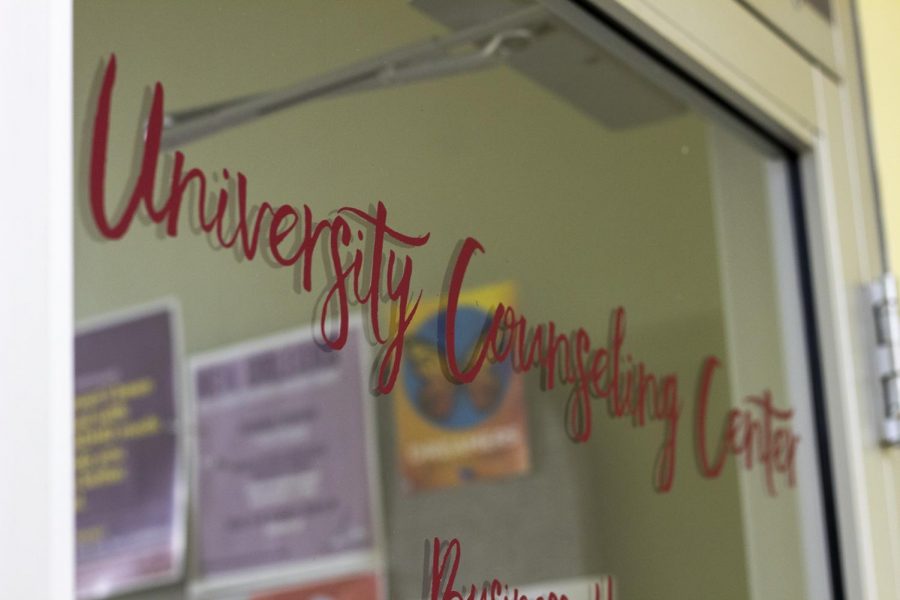Opinion: Anxiety is common, but manageable
The front door of the University Counseling Center. Counseling intern Ash Bayer has some advice for students who are dealing with stress and anxiety. Photo credit: Cristian Orellana
November 13, 2020
College can be exciting, but it is rarely easy. Adding to what is already a significant life transition, 2020 has brought a steady stream of life-altering news. Many students are now adjusting to online or hybrid learning. For some, this may be a blessing, removing the need to get dressed and leave their beds. On the flip side, it may feel harder to engage and connect with classmates, professors, and the course material.
Campus life might feel qualitatively different, and being socially active bears certain obstacles and risks, as inter-dorm visits are a no-no and the need to social distance and mask make larger assemblies and events unlikely and logistically difficult. You might be feeling disappointed, and you are not alone. Beyond the microcosm of the college campus is the looming future: either the ensuing years of your undergraduate degree or the question of what life holds post graduation.
This year seems to have us locked into a cone of uncertainty, inside which swirls pandemic protocols, polarized electoral politics, struggles for racial and economic justice and the threat of climate catastrophe. Doom scrolling through the news and social media does little but briefly introduce one facet of bad news after another, yet it does not provide the certainty most crave. These are prime environmental factors to increase feelings of anxiety among most people living in the U.S.
Anxiety is usually defined as a feeling of worry, nervousness, or unease about an uncertain outcome. It is characterized by concern cast into the future. In late June, the CDC released a report noting an increase of adults struggling with their mental health, approximately 40% of those surveyed. There seems to be a connection between the ambience of catastrophe cast by the events of 2020 and a decline in mental health.
Struggling at this time is a shared experience; it is in part, a response to our environment. Anxiety isn’t always pathological. In small doses it can help with performance and offers a confirmation that we care about an outcome. It is when anxiety becomes severe and pervasive that issues can arise, guiding us away from our values to avoid what our busy brains might fear as the worst outcomes.
How to manage the anxiety?
- Remember, to some degree, anxiety is a normal response. Yet, if you find yourself missing classes, avoiding friends, or unable to engage in activities you enjoy it might be exerting too much influence in your life.
- Consider: What makes you feel your best? Purposeful, empowered, connected, and joyful? What are you doing in those moments? Who are you with? How do you make time in your life each day to experience these feelings, despite anxiety or stress.
- Also notice when you are feeling particularly low or anxious. What have you been doing? Looking at social media, waking up and scrolling through the headlines?
- Ask yourself, “Am I hungry, angry, lonely, or tired? What steps can I take to support myself?” It can be as simple at taking a drink of water, going for a walk, taking a nap, or calling a friend.
- Try to give yourself a (brief) window of worry. Set a timer and use the next 15-20 minutes to really weigh out what is the worst that could happen while looking for evidence supporting these outcomes. What evidence is there to contradict your fears? What can you do to take care of yourself no matter the outcome?
- Take a deep belly breath, and an even longer, slower exhale. Anxiety can cause us to take shallow breaths, which in turn can contribute to our bodies feeling even more on edge than before. Deep breaths and slow exhalations can help our bodies move into “rest and relaxation” mode. If the body is relaxed, it is harder for the mind to remain stressed and anxious.
- Remember, you are not alone. You are living in this uncertain world among many who may have similar questions and fears. Reach out and talk about it. You may find yourself in empathetic company.







